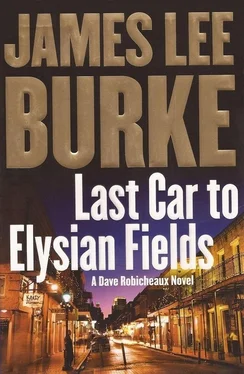On Monday I left the department at mid-morning and checked out a history of Louisiana blues music and swamp pop from the city library and began reading it in my office. It was raining outside, and through my window I could see a freight train, the boxcars shiny with water, wobbling down the old Southern Pacific tracks through the black section of town. The longtime sheriff”, an ex-marine who had marched out of the Chosin Reservoir, had retired and been replaced by my old partner, Helen Soileau.
I saw her stop in the corridor outside my office and bite her lip, her hands on her hips. She tapped on the door, then opened it without waiting for me to tell her to come in.
“Got a minute?” she asked.
“Sure.”
“A couple of N.O.P.D. plainclothes picked up a prisoner this morning. They said you and Clete bent a pornographic actor out of shape. They thought it was funny.”
“Pornographic actor?” I said vaguely.
“Ardoin was his name.”
“Clete flattened a coffeepot against the side of the guy’s head, but it wasn’t a big deal,” I said.
She had the muscular build of a man and blond hair that she cut short, tapering it on the sides and neck so that it looked like the freshly cropped mane on a pony. She wore slacks and a white, short-sleeve shirt, a badge holder hooked on her belt. She sucked in her cheeks and watched a raindrop run down the window glass above my head.
“Not a big deal? Interrogating people outside your jurisdiction, banging them in the head with a coffeepot? Dave, I never thought I’d be in this situation,” she said.
“Which one is that?”
She leaned on the windowsill and looked at the lights of the freight caboose disappearing between a green jungle on each side of the tracks.
“You and Cletus work it out, but I don’t want anybody, that means anybody , dragging N.O.P.D.’s dogshit into this department. I don’t want to be the dartboard for those wise-asses, either. We straight on this?” she said.
“I hear you.”
“Good.”
“Remember an R&B guitarist named Junior Crudup?” I asked.
“No.”
“He went into Angola and never came out. I think his granddaughter got swindled out of her land over in St. James Parish. I think Merchie Flannigan is mixed up in it.”
She straightened her back, then looked at me for a long moment. But whatever she had planned to say seemed to go out of her eyes. She grinned, shaking her head, and walked out into the corridor.
I followed her outside.
“What was that about?” I asked.
“Nothing. Absolutely nothing,” she said. “Streak, you’re just too much. God protect me from my own sins.”
Then she laughed out loud and walked away.
Monday night I listened to two ancient.78 recordings made by Junior Crudup in the 1940s. As with Leadbelly, the double-strung bass strings on his guitar were tuned an octave apart, but you could hear Blind Lemon and Robert Johnson in his style as well. His voice was haunting.
No, that’s not the right word. It drifted above the notes like a moan.
There are some stories that are just too awful to hear, the kind that people press on you after AA. meetings or in late-hour bars, and later you cannot rid yourself of. This is one of them.
Oldtime recidivists always maintained that the worst joints in the country were in Arkansas. Places like Huntsville and Eastham in the Texas penal system came in a close second, primarily because of the furious pace at which the convicts were worked and the punishment barrels they were forced to stand on throughout the night, dirty and unfed, if a gun hack decided they were dogging it in the cotton field.
But Angola Pen could lay claims that few other penitentiaries could match. During Reconstruction Angola became the model for the rental convict system, one emulated throughout the postbellum South, not only as a replacement for slave labor but as a far more cost-efficient and profitable successor to it. Literally thousands of Louisiana convicts died of exposure, malnutrition, and beatings with the black Betty. Each of the camps made use of wood stocks that were right out of medieval Europe. The scandals at Angola received national notoriety in the 1950s when convicts began slashing the tendons in their ankles rather than stack time on what was called the Red Hat Gang.
I drove up Bayou Teche to Loreauville, where the black man to whom I had sold my boat and bait business now lived with his daughter on a small plot of land not far from town. His house was set back in the shadows, on the bayou’s edge, the tin roof almost entirely covered by the overhang of pecan and oak trees. I parked my pickup truck in the trees and walked up to the gallery, where he sat in a wood rocker, a jelly glass filled with iced coffee in his massive hand.
His name was Batist, and he was both older than he would concede and yet indifferent to what the world thought of him. He had worked most of his life as a farmer, a muskrat trapper and commercial fisherman with my father, and as a packer in several canneries. He could not read or write, but he was nonetheless one of the most insightful people I had ever known.
A fat, three-footed raccoon named Tripod was eating out of a pet bowl on the steps.
“What’s the haps, “Pod?” I said to the raccoon, scooping him up in my arms.
Batist’s whiskers were white against his cheeks. He removed a cigar from the pocket of his denim shirt and slipped it into his jaw but didn’t light it.
“You ain’t come to see me this weekend,” he said.
“I had to take care of some business in New Orleans,” I said. “Years ago, you knew Junior Crudup, didn’t you?”
He raised his eyebrows. “Oh yeah, ain’t no doubt about that,” he replied.
“What happened to him?”
“What always happened to his kind back then. Trouble wherever he went.”
“Want to be a little more specific?”
“Back in them days there was fo‘ kinds of black folks. There was people of color, there was Negroes, and there was colored people. Under all them others was niggers.”
“Crudup was in the last category?”
“Wrong about that. Junior Crudup was a man of color. Called his-self a Creole. He wore an ox-blood Stetson, two-tone shoes, and a shirt and suit that was always pressed. Used to have a cherry red electric guitar he’d carry to all the dances. If a man could be pretty, that was Junior.”
“How’d he end up in Angola?”
“Didn’t fit. Not in white people’s world, not in black people’s world.
Junior had his own way. Didn’t take his hat off to nobody. He’d walk five miles befo’ he’d sit in the back of the bus. Back in them days, a black man like that wasn’t gonna have a long run.”
Tripod was struggling in my arms and kicking at me with his feet. I set him down and looked at the fireflies lighting in the trees. The air was cool and breathless, the surface of the bayou layered with steam. An electrically powered boat hung with lanterns was passing through the corridor of oaks that lined the banks. Batist’s attitudes on race were not conventional ones. He never saw himself as a victim, nor did he ever act as the apologist for black men who were forced into lives of crime, but by the same token he never told less than the truth about the world in which he’d grown up. So far I could not determine where he stood on Junior Crudup.
“It started at a dance at the beginning of the Depression,” he said.
“Junior was about t’irteen or fo’teen years old, working in a band for a black man had the most beautiful voice you ever heard. They was playing in a white juke by Ville Platte, on a real hot night, the place burning up inside. The singer, the man wit’ the beautiful voice, he was playing the piano and singing at the same time, sweat pouring down his face. A white woman come off the dance flo’ and patted her handkerchief on his brow. That’s all she done. That’s all she had to do.
Читать дальше












